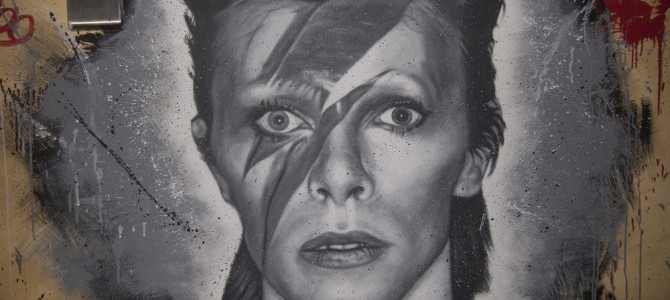The entertainment world has lost one of its brightest, most powerful stars. Singer-songwriter David Bowie has died at the age of 69 after months of fighting cancer.
“David Bowie died peacefully today surrounded by his family after a courageous 18-month battle with cancer. While many of you will share in this loss, we ask that you respect the family’s privacy during their time of grief,” said a statement posted on Bowie’s official Facebook page.
Bowie’s son, Duncan Jones, confirmed on Twitter, “Very sorry and sad to say it’s true. I’ll be offline for a while. Love to all.”
This Makes ‘Blackstar’ a Farewell Album
The artist who was known for his flamboyance, unique blend of styles, and his ability to reinvent himself has entertained the world for more than 40 years. He released his twenty-fifth album, “Blackstar,” on January 8. The album’s producer, Tony Visconti, a Bowie collaborator who has worked with the singer for decades, said “Blackstar” was a farewell gift to his fans.
“He always did what he wanted to do,” Visconti said. “And he wanted to do it his way and he wanted to do it the best way. His death was no different from his life — a work of art. He made ‘Blackstar’ for us, his parting gift. I knew for a year this was the way it would be. I wasn’t, however, prepared for it.”
One of the striking lyrics from the album’s track “Lazarus” is “Look up here, I’m in heaven / I’ve got scars that can’t be seen.” Here is Bowie’s final video. It’s stunning and haunting.
“He was an extraordinary man, full of love and life,” Visconti said. “He will always be with us. For now, it is appropriate to cry.”
‘The Biggest Cult of Popular Culture’
From his iconic alter ego, Ziggy Stardust, to Bing Crosby’s duet partner singing “Peace on Earth/Little Drummer Boy,” Bowie has been one of the most influential singers in all of pop music history.
After bursting onto the British music scene in the late 1960s with his hit song, “Space Oddity,” he reinvented himself during the glam rock era of the early 1970s as the androgynous Ziggy with the album “The Rise and Fall of Ziggy Stardust and the Spiders from Mars,” led by the hit single “Starman.” One biographer said Bowie challenged the core belief of rock music at that time and “created perhaps the biggest cult in popular culture.”
In 1975, after the short-lived Ziggy Stardust days, he found crossover success in America with the single “Fame” off the top-10 album “Young Americans.” He followed that with the 1976 avant-garde art rock LP “Station to Station,” featuring the hit song “Golden Years.”
Other top songs hitting the music charts in the ’70s and ’80s include “Let’s Dance,” “Modern Love,” “Heroes,” “Life on Mars,” “The Man Who Sold the World,” “Under Pressure,” “China Girl,” and so many others.
Bowie also enjoyed a successful film career with roles in “The Hunger,” “The Man Who Fell to Earth,” “Labyrinth,” “The Last Temptation of Christ,” and “The Prestige.” His most noted contribution to the acting world, however, was his Broadway performance as John Merrick in “The Elephant Man.”
One review of his stage acting debut said, “Playing a man too ugly to draw a freak audience, and too human to survive within a distorted body, Bowie shows a mastery of movement and vocal projection. He takes the stage with authority to create a stirring performance. . . . Judging from his sensitive projection of this part, Bowie has the chance to achieve legit stardom.”
The Life and Times of David Bowie
Bowie was born in Brixton, London, as David Robert Jones on January 8, 1947. His mother was a waitress and his father a promotions officer for a children’s charity. From an early age, he was known for being gifted and highly independent, even a bit rebellious. Drawn to music and inspired by artists such as Frankie Lymon, Fats Domino, and Elvis Presley, he learned to play the piano and saxophone.
In 1962 at the age of 15, Bowie formed his first band, the Konrads. They played at local youth events and weddings, but Bowie had higher aspirations. He left the band and joined several others before finding his unique voice and beginning his climb into music stardom. He also changed his name, choosing Bowie after the nineteenth-century American frontiersman James Bowie and the knife he had made popular.
The fame Bowie sought became a reality when he dressed up as Ziggy Stardust at the Toby Jug pub in Tolworth in the early 1970s. The show led to a tour of the United Kingdom, which developed a cult following.
The rest, they say, is history. Bowie moved to the United States in 1974 and recorded his album “Young Americans” with its “plastic soul” sound, marking a shift in the typical British pop style to something entirely new—and always evolving.
Bowie once said, “I don’t know where I’m going from here but I promise it won’t be boring.” That’s a promise he always kept. He told GQ magazine he wanted, more than anything else, to contribute to the culture he was living in. He did just that, and in a style that was entirely his own.









